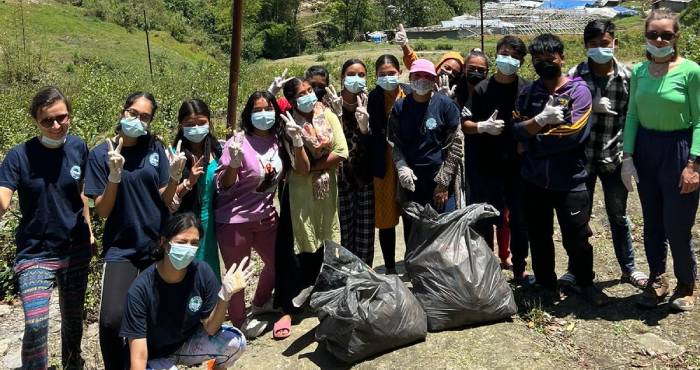
Available Workcamps
| Code | Location | start date | end date | Type | total Volunteers | Male | Female | Age |
|---|---|---|---|---|---|---|---|---|
| VINWC25-02 | Kathmandu | 10 Feb, 2025 | February 21, 2025 | EDU, ENVI, MANU, | 12 | 6 | 6 | 18+ |
| VINWC25-07 | Kathmandu | 08 May, 2025 | May 19, 2025 | EDU, ENVI, MANU, | 14 | 7 | 7 | 18+ |
| VINWC25-16 | Kathmandu | 11 Aug, 2025 | August 22, 2025 | EDU, ENVI, MANU, | 14 | 7 | 7 | 18+ |
Background: Tackling Environmental Challenges in Nepal
Environmental protection is one of the most pressing global issues today, and Nepal is no exception. Rapid urbanization, increased consumption, and changing lifestyles have created significant challenges, especially in waste management. Solid waste management in urban and rural areas is one of the most urgent concerns, as it actively affects the environment, public health, and local communities.
In many of VIN’s working areas, including schools, improper waste disposal—such as food scraps and other materials—is a serious problem. This leads to littering, health risks, and pollution, especially in vulnerable areas like Jitpurphedi, Kavresthali, and Okharpauwa near Kathmandu. Poor waste management affects urban and rural communities, contributing to environmental degradation, soil contamination, and health issues. Children are particularly vulnerable, suffering from respiratory diseases, skin infections, and gastrointestinal illnesses as a result of exposure to waste.
Non-biodegradable waste (NBW) is one of the key contributors to environmental harm. NBW accumulates in large quantities in rural areas, impacting agricultural productivity and local farmers’ livelihoods. As this waste pollutes agrarian land, it reduces its ability to sustain crops, affecting the food security of families and communities.
Why Waste Management Matters
Addressing these waste management issues is crucial to preserve Nepal’s environment and ensure public health. By adopting sustainable practices such as waste segregation, recycling, and composting, communities can transform waste into a valuable resource rather than a harmful by-product.
Under the “Environmental Stewards: Preserving Our Common Home” project, VIN aims to empower local communities to take action on waste management. By raising awareness and providing practical solutions, the project will help create cleaner, greener environments and improve public health.
Key Objectives
Reduce water, land, and air pollution through environmental education and community cleaning activities.
Empower communities to adopt sustainable waste management practices, including reducing, reusing, and recycling.
Raise awareness about the importance of environmental conservation and its long-term benefits for public health and sustainability.
Activities & Work
Waste Management & Clean-Up Campaigns
Community Clean-Up Campaigns: Volunteers will work with local communities to organize clean-up drives. These activities will focus on clearing waste from public spaces, reducing litter, and creating cleaner environments.
Waste Management Training
3R Principles (Reduce, Reuse, and Recycle): Train local communities on effective waste management using the 3R This will include waste segregation, recycling, composting techniques, and proper waste disposal methods.
Composting Training: Volunteers will guide households on creating compost at home using organic waste. This method reduces waste and provides organic fertilizer for better agricultural practices.
Sustainable Agriculture Training
Kitchen Garden Training: Promote sustainable farming by teaching local households how to create kitchen gardens. This activity will empower families to grow their vegetables, reduce the need for external supplies, and contribute to better nutrition.
Location: Jitpurphedi, Kathmandu
The project will take place in the Jitpurphedi community, located in Tarakeshwor Municipality, on the outskirts of Kathmandu. Around 10-12 km from the main ring road to Balaju, this rural hills, fields, and forests surround area, providing a perfect setting for environmental conservation and community engagement.
Participation Fee & How to Apply
The participation fee for the Environmental Stewards program is 270 Euros (+30 Euros for transportation), payable upon arrival at the VIN Office.
To participate, complete and submit the Volunteer Exchange Form (VEF) through the sending organization. Once we receive the form, you will receive a detailed information sheet and an acceptance letter.
Frequently Asked Questions (FAQs)
What is the focus of this project?
The project focuses on solid waste management, pollution control, and sustainable agricultural practices in rural communities near Kathmandu. Volunteers will help raise awareness and train locals in waste segregation, recycling, composting, and kitchen garden creation.
Why is waste management critical in Nepal?
Improper waste management in Nepal contributes to significant environmental degradation, health risks, and land contamination. Addressing these issues is crucial for creating cleaner and healthier communities.
Who can volunteer for this project?
This project is open to individuals 18 and older passionate about environmental conservation and community work. Volunteers will work closely with local communities to implement sustainable solutions.
How does this project help local communities?
The project aims to reduce pollution, improve public health, and promote a cleaner environment for future generations by empowering communities with the knowledge and skills to manage their waste sustainably.
Join us as an Environmental Steward and help preserve Nepal’s natural beauty for generations. Your involvement will directly impact the environment and the lives of local communities. We can create a cleaner, greener, and more sustainable future!

 Member of
Member of